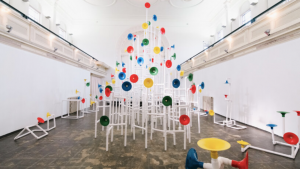After delivering a keynote speech at the 13th International Conference of the European Academy of Design (EAD), Design Indaba founder Ravi Naidoo sent out a challenge to the audience.
The challenge turned into a competition called DUNDEED, where the EAD collaborated with Design Indaba to set the challenge to design research teams around the world to creatively engage with the United Nations’ Sustainable Development Goals.
We received entries from around the world tackling different issues. The judges selected a shortlist of five candidates.
The shortlisted candidates not only wanted to address the United Nations' SDGs but also spoke to a sense of community and collaboration.
The projects included Victoria Stoch's communication design project to help HIV/Aids patients in tracking their progress throughout their monthly course of medication; while another entry by Alejandro Mandrio, called ALO, explores how we can build healthier and more sustainable futures by stimulating individuals at early stages.
After more deliberation among the judges, the winner was chosen.
We're proud to announce that Debalina Bera with the project she entered, The Welcome Tent, is the winner of the £5,000 prize.
The aim of the project is to design a strategy for an inclusive safe-space to amplify silenced voices through idea generation in order to fight existing systematic injustice, in collaboration with humanKINDER.
A social innovation enterprise, humanKINDER, runs projects to better support displaced communities all over Europe. The Welcome Tent project makes use of an ex-army catering tent from 1956, which has been repurposed for peace.
The tent is used as a space to bring uprooted people together over food, cooking with a global community who are acting with courage and determination, despite the authoritarian conditions which are criminalising solidarity and increasingly ignoring International Human Rights Law.
Food is a universal language and a basic life necessity. 12 of the 17 Sustainable Development Goals feed into Food and Nutrition (WHO).
The thought of food gets us excited, happy, nostalgic, experimental, hungry. Food is present silently in everything we do and don't, in celebrations, in sorrow, in need, in every possible walk of life.
The intention of the project is to help facilitate diverse growth and sense of belonging amongst displaced local communities.
The judges found that in terms of research and innovation, this project was strong as its solution involved communities as part of the solution.
Design Indaba, International Conference of the European Academy of Design (EAD), University of Dundee and Imagination Lancaster at Lancaster University would like to thank all who participated.
More on the Dundeed challenge:
Here are the five shortlisted candidates for the Dundeed challenge.









